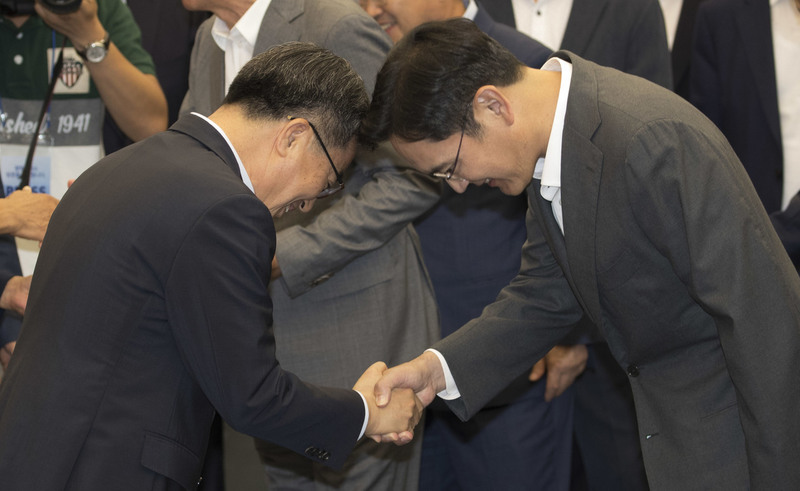 |
|
South Korean Deputy Prime Minister and Minister of Strategy and Finance is greeted by Samsung Electronics Vice Chairman Lee Jae-yong at the Samsung Electronics semiconductor plant in Pyeongtaek, Gyeonggi Province, on Aug. 6. (Kim Seong-gwang, staff photographer)
|
Lee Jae-yong appears poised to promote company’s biotech operations
In a meeting with South Korean government officials at the Samsung Electronics semiconductor plant in Pyeongtaek, Gyeonggi Province, on Aug. 6, Vice Chairman Lee Jae-yong promised to bring the biopharmaceutical industry the success that semiconductors currently enjoy while asking for regulations on that industry to be relaxed so that the price of drugs could be freely determined by the market. Lee’s remarks appear aimed to promote Samsung’s biotech operations — a pet project of Lee’s — and to emphasize the legitimacy of those operations, which have been tarnished by bookkeeping irregularities. Samsung paid particular attention to its biotech business during the event: the only president of Samsung’s over sixty affiliates present at the event was Koh Han-seung, president of Samsung Bioepis (a subsidiary of Samsung BioLogics). During the meeting, Koh asked the government to alter its policy on the price of biosimilar products, streamline the import and customs process for pharmaceutical raw materials and provide various forms of tax relief. A biopharmaceutical refers to a medical product that is made with animal proteins or hormones, while a biosimilar is a medicine with the same basic components of a drug whose patent has expired. What was striking was that Koh was basically asking for permission to raise the price of biosimilars. “In the US and Europe, drug prices are determined by market mechanisms such as competition and bidding. If sensible drug prices are allowed to be set through companies voluntary competing in the market in South Korea, too, it will not only increase the competitiveness of the biosimilar industry but also reduce the government’s fiscal burden for medicine in the mid- and long term,” Koh said. When a biosimilar drug is developed at present, the price of the original drug must be reduced by 30 percent, while the price of the biosimilar (a copy of the original) is set even lower, but Koh wants this system done away with. While Samsung claims that this is “the view of the entire industry,” it actually represents more of a special request for Samsung. Celltrion — the company that splits control of the domestic biosimilar market with Samsung — is not asking for such changes in the price of biosimilars. This apparently results from a difference in the two companies’ pricing policy. For example, Samsung sets the price of biosimilar drugs at 20-30 percent of the original medicine, while Celltrion goes lower than that, to 5-10 percent. “Samsung and Celltrion have different positions. There’s no prevailing view in the industry about relaxing regulations on drug prices for biosimilars,” said a source with an association connected with biopharmaceuticals. Samsung’s decision to have the president of a biotech affiliate ask for a price hike appears to reflect Lee Jae-yong’s focus on the biotech business. Since Lee began inheriting control of the Samsung Group in 2009, Samsung has been moving into areas such as biotech and health care that it regards as the next major industries. In the biotech sector, Samsung BioLogics has grown rapidly since its establishment in 2011, reaching a market cap of 27 trillion won (US$24.13 billion) in just seven years. Another apparent motivation is to help Samsung BioLogics — which has recently been embroiled in a controversy about fraudulent accounting — repair its reputation. “Samsung BioLogics has recently been accused of committing accounting fraud and receiving preferential treatment from regulators when it went public. The apparent reason that the president of Samsung Bioepic was chosen to attend the meeting instead of another Samsung affiliate was to underscore the business’s legitimacy,” said an industry source. On Aug. 7, the day after the government promised to seriously consider Samsung’s request for relaxing regulations in the biotech sector, Samsung BioLogics’ stock price shot up by 6.53 percent from the day before to close the day at 424,000 won (US$378.95). Samsung C&T, the parent company of Samsung BioLogics, also saw its stock go up 2.88 percent from the day before to 125,000 won (US$111.72) while stocks at Samsung Electronics, the second largest shareholder in Samsung BioLogics, increased 1.97 percent to 467,000 won (US$417.41). By Choi Hyun-june and Lee Wan, staff reporters Please direct comments or questions to [english@hani.co.kr]






